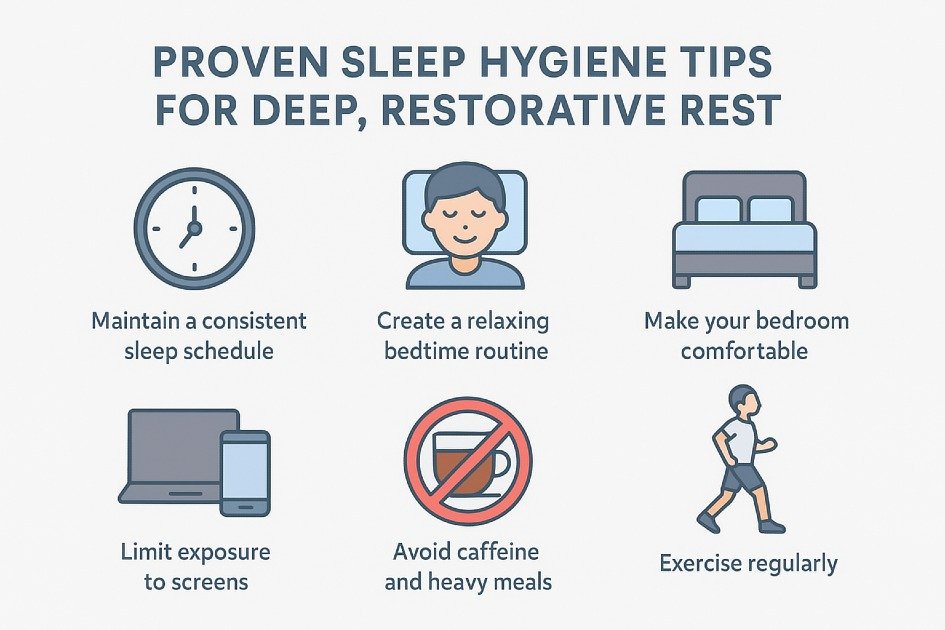Have you ever wondered why some nights your body sinks effortlessly into deep rest while other nights feel like a battle against your own mind and muscles?
Sleep hygiene guides your body into deep, healing sleep. When you use simple daily habits to support your natural rhythms, you make it easier to rest well at night and feel more focused and calmer during the day.
Key practices such as maintaining a consistent sleep schedule, establishing a calming bedtime routine, and optimizing the sleeping environment promote a natural downshift in the nervous system.
Limitations on screen time, careful selection of evening foods, and stress management can significantly improve nighttime ritual that signals safety for unwinding, leading to consistent deep sleep and overall well-being.
Harvard Health defines sleep hygiene as a set of practices and routines aimed at improving sleep quality, including maintaining a regular sleep schedule, maintaining a dark and cool bedroom.
This guide emphasizes the extensive benefits of effective sleep hygiene beyond merely improving sleep quality. It helps stabilize energy levels, enhances mental clarity, supports emotional balance, and facilitates physical recovery.
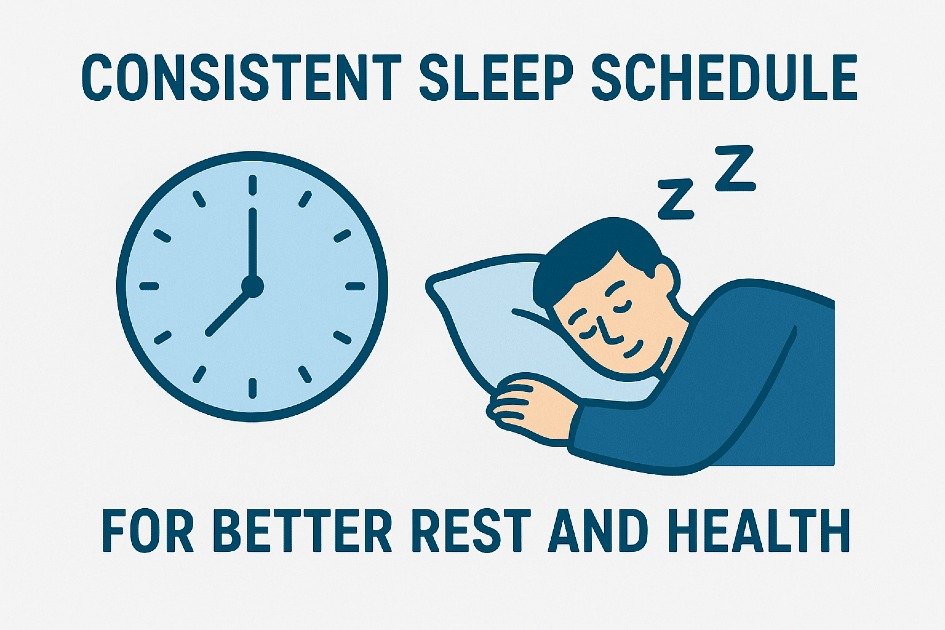
Creating a Consistent Sleep Schedule
Consistent sleep schedules are crucial for sleep hygiene, as irregular patterns disrupt the body’s natural circadian rhythm, causing irritability and reduced focus. Regular sleep signals help the body regulate sleep.
Why a Steady Sleep Schedule Boosts Your Health
Why it matters:
Maintaining a steady sleep schedule helps regulate the body’s internal clock, enhances daytime energy, and supports long-term health by reducing fatigue, improving concentration, and preventing obesity, heart disease, and weakened immunity.
How to do it:
- Go to bed when you feel sleepy and pick a bedtime that fits. If needed, shift it slowly by 15–30 minutes instead of making substantial changes.
- Wake up at the same time every day, even on weekends, to keep your body clock steady and prevent oversleeping.
- Try a calming bedtime routine, read a book or play soft music to relax before sleep.
- Track your sleep with a journal or app. Write down your bedtime, wake-up time, and any night awakenings.
- Manage schedule changes wisely—stay on track with your usual wake time, and if you need rest, take a short 20–30-minute nap without cutting into nighttime sleep.
I keep my health strong by going to bed at the same time, winding down relaxing habits, avoiding screens, and making my bedroom calm and comfortable.
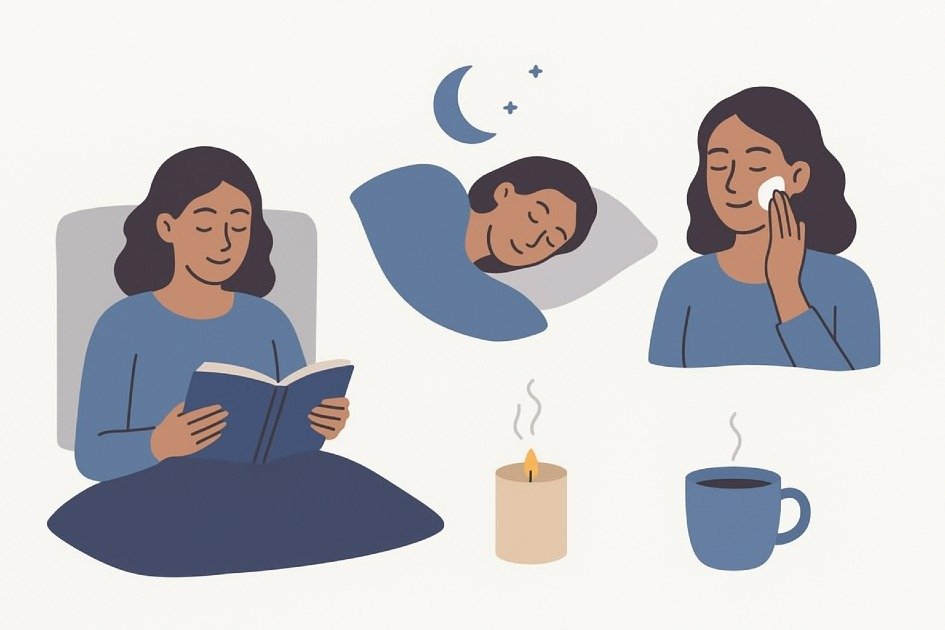
Build a Relaxing Bedtime Routine
A calming bedtime routine is crucial for effective sleep hygiene, signaling the nervous system to relax and reduce nighttime anxiety and restlessness.
Unplug from Digital Distractions
Why it matters:
Modern life’s constant exposure to screens and notifications disrupts melatonin, a sleep-inducing hormone, making it difficult to fall asleep and causing it to be groggy the next day.
How to do it:
- Turn off screens at least an hour before bed.
- Swap phone scrolling with a calming habit like reading a book or playing soft music.
- Use blue light filter apps or glasses when you cannot avoid screens.
Creating a Gentle Movement Routine
Why it matters:
Gentle stretches or yoga, unlike vigorous exercise, can relax muscles and lower stress hormones, prevent restless nights and promote muscle relaxation.
How to do it:
- Take 5–10 minutes to stretch your main muscles.
- Do a short yoga flow with deep breaths and slow, steady moves.
- Move with steady, controlled motions to avoid sudden heart rate jumps.
Incorporate Mindfulness or Meditation
Why it matters:
Mindfulness helps calm the mind, reduces stress, and lowers cortisol, promoting deep rest by reducing racing thoughts and preventing sleep.
How to do it:
- Spend 5 minutes on a guided meditation.
- Breathe deeply: inhale for four, hold four, exhale six.
- Picture a peaceful forest or soft ocean waves to calm your mind.
Read or Listen to Soothing Content
Why it matters:
Reading or listening to relaxing content helps your brain disengage from daily stressors, preparing it for sleep.
How to do it:
- Read calm, easy books—skip thrillers or heavy topics.
- Listening to audiobooks or calming podcasts when reading feels tiring.
- Use a dim bedside lamp or nightlight to keep your bedroom softly lit and sleep-friendly.
Sip a Calming Beverage
Why it matters:
Certain beverages, such as herbal teas, warm milk, or caffeine-free drinks, can signal the body to relax and wind down.
How to do it:
- Drink chamomile, lavender, or valerian root tea 30 minutes before sleep to relax your mind and body.
- Skip sugary and caffeinated drinks can disrupt your sleep.
- Turn it into a mindful habit: drink slowly, notice the warmth and taste.
Set a Consistent Bedtime Signal
Why it matters:
Consistency in sleep habits enhances your circadian rhythm, promoting natural sleep by recognizing predictable bedtime cues.
How to do it:
- Each night, unplug, stretch, practice mindfulness, and enjoy a calming drink.
- Light a candle, play soft music, or set a gentle alarm to start your bedtime routine.
- Stick to your routine every day, even on weekends, to keep your body’s rhythm steady.
I wind down for better sleep by turning off screens, stretching, practicing mindfulness, and sipping a calming drink. These habits refresh my mind and body for deep, restorative rest.
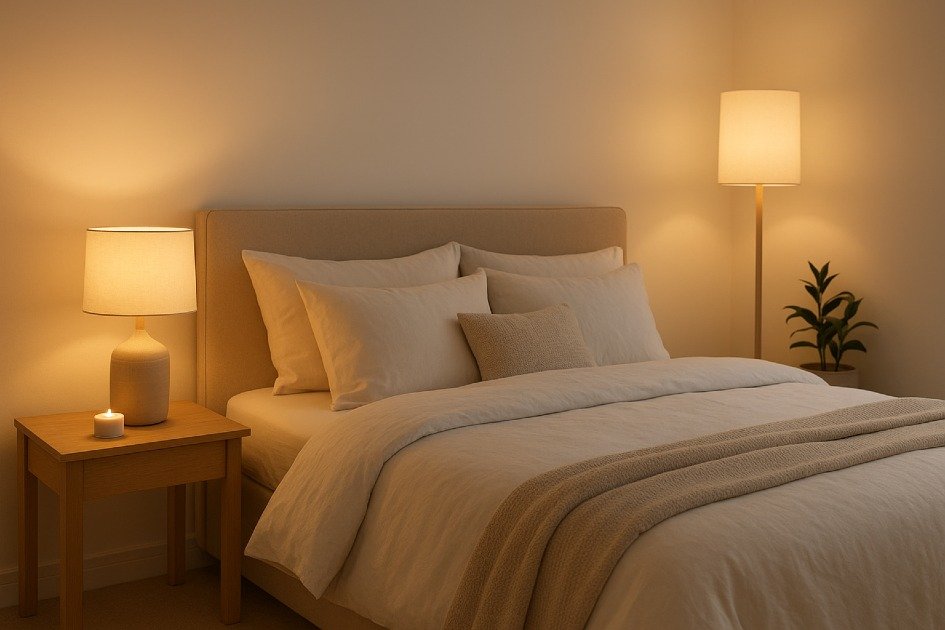
Optimize Your Sleep Environment
Optimizing your sleep environment is crucial for achieving restorative sleep. Your surroundings directly impact sleep quality, from rapid to deep sleep. By implementing key aspects, your bedroom can become a sanctuary.
Keep Your Bedroom Dark
Why it matters:
Darkness triggers brain production of melatonin, a sleep hormone, while light, from electronics or streetlamps, can disrupt circadian rhythm and decrease sleep quality.
How to do it:
- Use blackout curtains or shades to keep outside light out and sleep better.
- Wear an eye mask to block light when your room is not completely dark.
- Cover or turn off small lights on chargers, clocks, and devices to sleep better.
- Use night lamps for soft lighting—they disturb melatonin less and help you sleep better.
Maintain a Cool Temperature
Why it matters:
The body naturally cools down during sleep, and a consistently cool environment promotes deeper, more restorative sleep phases.
How to do it:
- Set your bedroom temperature to 60–67°F (15–20°C) for better sleep.
- Adjust fans, AC, or heaters wisely to stay comfortable.
- Use a smart thermostat that dims the lights and cools your room before bed for better sleep.
Reduce Noise Distractions
Why it matters:
Noise can disrupt sleep, leading to awakenings and reducing REM sleep, resulting in morning refreshments.
How to do it:
- Block outside sounds with thick curtains or rugs that soak up noise.
- Use a white noise machine or a calming sound app to block sudden noises and help you relax.
- Use quality earplugs to block noise if you live in a loud area.
- Place your bed away from doors and windows to block outside noise.
Choose Comfortable Bedding
Why it matters:
Poor bedding can negatively impact spinal alignment, muscle relaxation, and comfort, leading to tossing, turning, and persistent aches, sabotaging sleep hygiene.
How to do it:
- Choose a mattress that matches your body and sleep style, like memory foam, hybrid, or natural latex.
- Choose a pillow that fits your sleeping position and keeps your neck supported.
- Choose soft, breathable sheets to stay cool and protect your skin.
- Try smart bedding that adjusts light and temperature for you.
Declutter and Simplify Your Space
Why it matters:
A cluttered bedroom can exacerbate stress, hindering relaxation, while minimalism promotes a tranquil environment, signaling the brain to rest.
How to do it:
- Use your bedroom only for sleep and rest.
- Store clothes, books, and electronics neatly in drawers or bins.
- Keep your nightstand simple just a lamp, water, and an alarm clock.
- Choose soft colors and simple décor to make your space feel calm and relaxing.
Limit Electronic Devices
Why it matters:
Blue light from phones, TVs, and computers can inhibit melatonin production, while notifications and alerts can disrupt sleep without conscious awareness, thereby affecting overall sleep quality.
How to do it:
- Keep devices out of your bedroom.
- Turn on “Do Not Disturb” on all devices while you sleep.
- Use soft nightlights to safely move around at night.
- Swap screens for calming activities like reading or journaling before sleep.
Use Aromatherapy and Calm Scents
Why it matters:
Lavender and chamomile scents have been proven to reduce stress and improve sleep quality, making aromatherapy an effective way to enhance relaxation rituals and create a sanctuary in the bedroom.
How to do it:
- Spray your pillow or run an essential oil diffuser at night to relax and sleep better.
- Use light scents to prevent irritation or headaches.
- Use calming scents during bedtime rituals like reading or meditating to boost relaxation.
I turned my bedroom into a sleep haven by using a comfortable mattress, blackout curtains, and a white noise machine. Now, I sleep deeper and feel more rested.
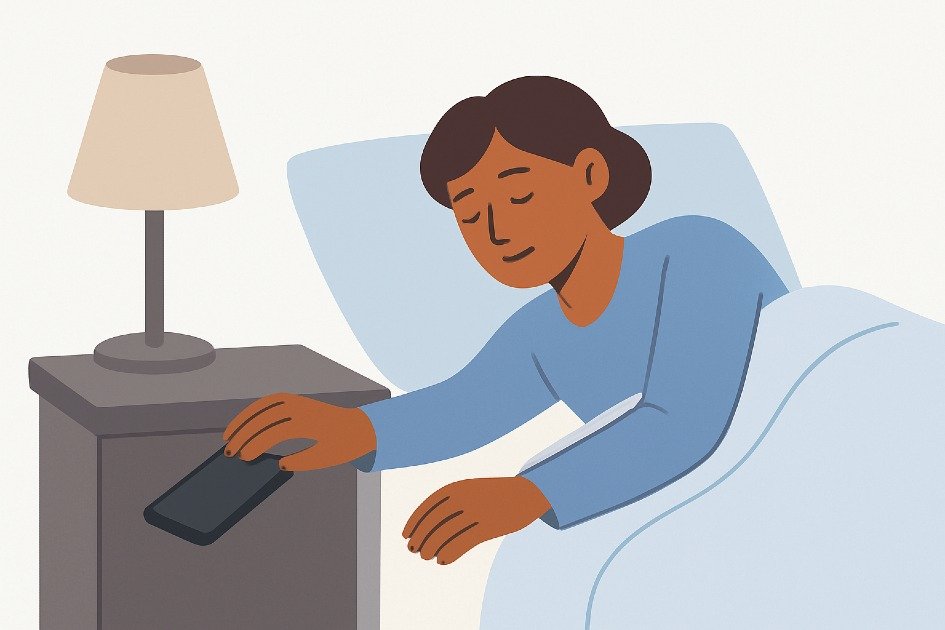
Limit Screen Time Before Bed
Limiting screen time can significantly improve sleep hygiene and overall health, as it reduces the presence of devices in our hyperconnected world.
Why Blue Light Disrupts Your Sleep
Why it matters:
Digital screen blue light disrupts melatonin production, causing sleep deprivation, fatigue, and lower immunity, leading to chronic fatigue and fatigue.
How to do it:
- Use your device’s blue light filter an hour before sleep to help your eyes relax and improve rest.
- Wear blue light glasses in the evening to protect melatonin and improve sleep.
- Lower screen and light brightness to copy the natural sunset and signal your body it is time to wind down.
I follow these steps to honor my body’s natural sleep rhythm, keeping my sleep healthy and strong.
Why Mindless Scrolling Keeps Your Brain Awake
Why it matters:
Social media, while relaxing, can stimulate the brain, leading to stress and anxiety, making it challenging to achieve a calm sleep state.
How to do it:
- Turn off screens one hour before bed to help your mind and body relax for deep sleep.
- Swap screen time for calming activities like journaling, reading a book, or listening to soft music.
- Set app timers: Limit how long you use apps each day to stay focused and reduce screen overload.
I use this method to sleep better and clear my mind of stress each night.
Why Interactive Screens Delay Relaxation
Why it matters:
TV and interactive apps can disrupt relaxation by activating the brain through action-packed shows, gaming, and learning platforms, increasing heart rate and stress hormones.
How to do it:
- Turn off screens 30–60 minutes before bed and enjoy quiet activities like reading or journaling.
- Choose calm content: listen to audiobooks, guided meditations, or podcasts that relax your mind.
- Build a bedtime ritual: Dim the lights, stretch gently, and practice deep breathing to relax your body and mind.
I use these strategies to sleep better and stay consistent, keeping my sleep healthy and strong.
Why Consistency Matters
Why it matters:
Irregular screen habits disrupt the body’s circadian rhythm, causing difficulty in recognizing bedtime and shifting sleep cycles, resulting in groggy mornings and restless nights.
How to do it:
- Create a bedtime routine: Turn off screens at the same time every night.
- Talk with your family: Set the same bedtime rules to avoid distractions and interruptions.
- Track your sleep: Use a journal or app to watch your rest improve.
When I stick to a routine, my body learns to expect sleep, making rest come naturally and strengthening my sleep habits.
Why Small Steps Are Better Than Radical Change
Why it matters:
Gradual adjustments to screens can make the change achievable and sustainable, rather than attempting to eliminate all screens at once.
How to do it:
- Start with the easiest screen to cut turn off your phone before TV or laptop.
- Cut screen time in 15-minute steps: Gradually reach your goal to make it easier.
- Cherish small wins: Every screen-free hour improves your sleep.
I make slight changes to my sleep habits, and over time they boost my rest and health. I use blue light glasses, time apps, and smart home lighting to cut screen time and sleep better.

Be Mindful of Food and Drink
Consuming foods and beverages before bedtime can impact sleep hygiene, disrupt circadian rhythm and cause heartburn. Mindful eating and drinking can enhance rest and wake up refreshed.
Avoid Heavy Meals Close to Bedtime
Why it matters:
Large meals can delay sleep, increase acid reflux risk, and disrupt sleep hygiene by raising blood sugar and metabolism at the wrong time.
How to do it:
- Eat dinner at least 2–3 hours before bedtime to help your body digest and improve sleep quality.
- Eat light at night: choose salads, steamed veggies, or lean protein.
- Share easy sleep-friendly snacks and simple meal plans to help readers act for better rest.
I keep a small snack, like a banana or a few almonds, near bedtime. They are easy on my stomach and help my body make melatonin for better sleep.
Reduce Caffeine Intake in the Afternoon
Why it matters:
Caffeine, which inhibits adenosine, can delay sleep onset, highlighting the importance of proper caffeine management in maintaining a healthy sleep hygiene routine.
How to do it:
- Stop caffeine by mid-afternoon, around 12–6 PM, to protect your sleep.
- Replace your afternoon coffee with calming herbal teas like chamomile for better rest.
- Keep track of all caffeine—chocolate, soda, and energy drinks included!
I used to grab a 4 PM latte, but I noticed it kept me up at night. Switching to caffeine-free drinks helped me fall asleep faster and sleep deeper.
Limit Alcohol Consumption in the Evening
Why it matters:
Alcohol can cause drowsiness, disrupt REM sleep, increase nighttime awakenings, and lead to dehydration, compromising sleep hygiene and causing morning grogginess.
How to do it:
- Limit evening drinks to one standard serving or avoid them altogether.
- Drink water between alcoholic drinks to stay hydrated and protect your body.
- Try alcohol-free or low-alcohol drinks—mix them with non-alcoholic wines or mocktails for a healthy twist.
After a night out, I drink water, stretch lightly, or take a warm shower to help my body relax and digest.
Incorporate Sleep-Supportive Foods
Why it matters:
Certain foods naturally stimulate the production of melatonin and serotonin, crucial for deep sleep, thereby improving sleep hygiene by calming the nervous system and regulating blood sugar levels.
How to do it:
- Eat tryptophan-rich foods—like turkey, eggs, or pumpkin seeds—at dinner or as an evening snack to support better sleep.
- Choose complex carbs like oats or sweet potatoes to keep energy steady and blood sugar balanced.
- Try calming herbal teas like chamomile, lemon balm, or valerian root to relax your mind and body.
I eat a small snack of yogurt with flaxseeds or a banana before bed, and I fall asleep faster and sleep more soundly.
Hydrate Smartly, Not Excessively
Why it matters:
Dehydration can hinder sleep, cause leg cramps or headaches, and overhydration before bedtime can disrupt sleep cycles and weaken sleep hygiene.
How to do it:
- Drink water evenly during the day instead of gulping a lot at night.
- Drink a small glass of water 30–60 minutes before bed if you feel thirsty.
- Skip sugary or caffeinated drinks, they can raise your metabolism and keep you awake.
I keep a water bottle by my bed and take small sips, so I do not break my deep sleep.
Transition Smoothly Between Meals and Sleep
Why it matters:
Establishing a clear buffer between eating and sleeping helps the body naturally wind down, strengthens sleep hygiene, and signals rest time.
How to do it:
- Finish dinner 1–3 hours before bedtime to help your body digest and sleep better.
- Do calming activities before bed, like gentle yoga, reading, or soft music, to help your mind and body relax.
- Use dim lights while doing this habit to help your body make melatonin.
I make slight changes in my evening meals and drinks, and it boosts my sleep, so I wake up energized and alert.
Recap: Small Tweaks, Big Impact on Sleep Quality
Sleep is a crucial aspect of overall well-being and optimizing it can lead to significant health improvements.
Even small adjustments, such as changing the light time, turning off screens, or adopting a gentle evening routine, can significantly improve sleep quality.
Investing in supportive pillows or blackout curtains can transform nightly rest into a luxurious experience. Constant action and awareness are essential for maintaining sleep hygiene.
Even slight changes, like morning sunlight exposure or mindful wind-down exercises, can anchor sleep patterns and fortify vitality.
Enhanced sleep also boosts mood, memory, and immunity, promoting energy, resilience, and productivity. By embracing the journey of sleep hygiene, small steps can build monumental results.
Frequently Asked Questions
How much sleep do adults need each night?
Adults require 7-9 hours of restorative sleep, varying based on circadian rhythms and lifestyle. Consistent sleep hygiene, regular bedtime, caffeine limit, and ergonomic pillows enhance rejuvenating sleep.
Is it harmful to hit the snooze button repeatedly in the morning?
Interrupting your sleep cycle can disrupt REM sleep, so a good sleep hygiene routine involves consistent daily wake-up times and avoiding alarms that disrupt your natural sleep architecture.
Can supplements improve sleep quality?
Supplements like magnesium, valerian root, and melatonin can aid sleep, but should complement sleep hygiene practices and be paired with calming rituals for enhanced efficacy.
What is the best way to recover from a few nights of poor sleep?
Recovery requires consistent sleep hygiene, regular bedtime, avoiding naps, limiting stimulants, light exposure, gentle movement, and weighted blankets to re-establish circadian rhythm and promote relaxation.
Does sleeping in on weekends help or hurt sleep hygiene?
Oversleeping on weekends disrupts circadian rhythm, so maintain regular bedtimes, aim for restorative naps, and consider sleep-tracking devices for consistent rest patterns.
How can I calm my mind at night?
Mindfulness, deep breathing exercises, guided meditations, journaling thoughts, and aromatherapy diffusers can help calm the nervous system and promote deep sleep.
Are naps beneficial or harmful to sleep hygiene?
Strategic naps, lasting 15-30 minutes, enhance alertness without disrupting sleep. Pairing them with a dimly lit, tranquil environment and using sleep masks enhances restorative benefits.
Does exercising in the evening affect sleep hygiene?
Exercise before bedtime for healthy sleep, while gentle evening routines like stretching, yoga, or walking promote relaxation and sleep hygiene, with ergonomic yoga mats being a helpful tool.
Can technology help improve sleep hygiene?
Digital sleep aids, such as blue-light-blocking glasses and apps, can improve sleep hygiene by regulating circadian rhythm, preventing melatonin suppression, and optimizing nighttime environments.
How can I make my bedroom a sanctuary for better sleep hygiene?
Create a restful bedroom environment with cool temperatures, dim lighting, supportive bedding, blackout curtains, and calming scents to enhance sleep hygiene and promote restorative sleep.

